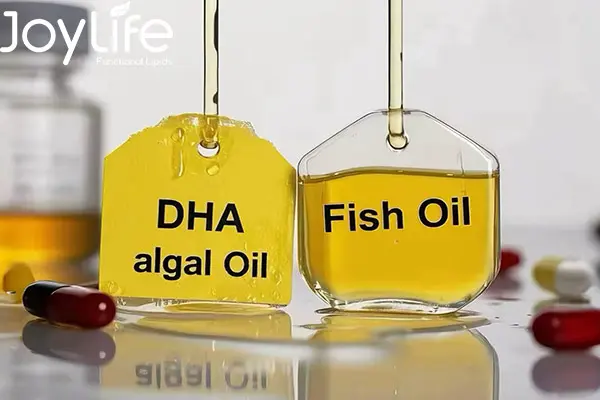



Are you wondering Are tuna oil and fish oil the same? what's the difference between tuna oil and fish oil, how to choose them?
Today Joylife Nutripharma Inc would like to share some info for your reference,
if you have more demand or difference opinion pls email us, info@joylifenutripharma.com
1.The difference between tuna oil and fish oil lies primarily in their source, nutritional profile, potential contaminants, and sustainability.
Here's a detailed breakdown of their differences and guidance on how to choose between them.
| Aspect | Tuna Oil | Fish Oil |
|---|---|---|
| Source | Extracted exclusively from tuna fish. | Extracted from a variety of fatty fish (e.g., salmon, mackerel, sardines, anchovies). |
| Omega-3 Content | High in DHA usually,20%~30% but levels depend on the tuna species. | EPA and DHA levels vary from 0% to 90% depending on the fish source (e.g., salmon oil is rich in DHA). |
| Contaminant Risk | Higher risk of contaminants like mercury, as tuna are larger, predatory fish. | Lower risk of contaminants, especially when sourced from smaller fish like sardines or anchovies. |
| Sustainability | Tuna fishing often raises sustainability concerns due to overfishing. | More sustainable options are available (e.g., fish oil from small, fast-reproducing fish). |
| Taste and Smell | Stronger fishy taste and odor. | Milder taste and odor, depending on the fish source. |
| Cost | Typically more expensive due to the specific sourcing from tuna. | Generally more affordable, especially when sourced from smaller fish. |
| Uses | Often used in supplements and fortified foods. |
Widely used in supplements, cooking, and as a dietary additive. |
if you want choose raw material pls visit
https://www.joylifenutripharma.com/product/product-categories/omega-fish-oilpowder.html
Fresh stock for Natural made Omega3 Fish oil and omega fish oil powder, Joylife Nutripharma Inc
Tuna Oil: Choose tuna oil if you’re looking for a potent source of omega-3s, particularly EPA and DHA, and don’t mind the stronger taste or higher cost.
Fish Oil: Opt for fish oil if you want a more versatile and affordable option with a milder taste. It’s also better for daily supplementation.
Tuna Oil: Be cautious about contaminants like mercury, PCBs, and dioxins. Look for molecularly distilled or third-party tested tuna oil to ensure purity.
Fish Oil: Generally safer, especially when sourced from smaller fish like sardines or anchovies. Still, choose products that are third-party tested for purity.
Tuna Oil: Tuna populations are often overfished, so check for certifications like MSC (Marine Stewardship Council) to ensure sustainable sourcing.
Fish Oil: More sustainable options are available, particularly from small fish like anchovies or sardines. Look for sustainability certifications.
Tuna Oil: Ideal for individuals who need higher doses of EPA and DHA, such as those with specific health conditions (e.g., high triglycerides, inflammation).
Fish Oil: Suitable for general health maintenance, including heart health, brain function, and joint health.
Tuna Oil: Has a stronger fishy taste and odor, which may not be suitable for everyone.
Fish Oil: Milder in taste, especially when sourced from smaller fish or available in flavored capsules.
Tuna Oil: Typically more expensive due to the specific sourcing and processing required.
Fish Oil: More cost-effective, making it a better choice for long-term use.
3.1Check for Third-Party Testing: Look for certifications from organizations like IFOS (International Fish Oil Standards) or USP (United States Pharmacopeia) to ensure purity and potency.
3.2 Look for Sustainability Certifications: Choose products with MSC or Friend of the Sea labels to support sustainable fishing practices.
3.3Opt for Molecularly Distilled Oils: This process removes contaminants like mercury and PCBs, ensuring a safer product.
3.4 Consider Form: Fish oil and tuna oil are available in liquid, capsule, or softgel forms. Choose one that suits your preference and lifestyle.
3.5 Read Labels: Check the EPA and DHA content per serving to ensure you’re getting adequate omega-3s.
You need a high-potency source of omega-3s.
You’re okay with the stronger taste and higher cost.
You’ve confirmed the product is free from contaminants and sustainably sourced.
You want a more affordable and versatile omega-3 supplement.
You prefer a milder taste and odor.
You’re concerned about sustainability and environmental impact.
Both tuna oil and fish oil are excellent sources of omega-3 fatty acids, but they differ in sourcing, sustainability, and potential contaminants. Your choice should depend on your specific health needs, budget, and preferences. Always prioritize high-quality, third-party tested products to ensure safety and efficacy.